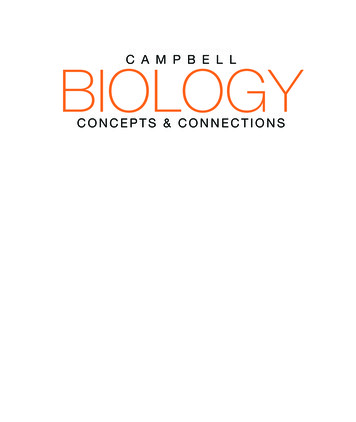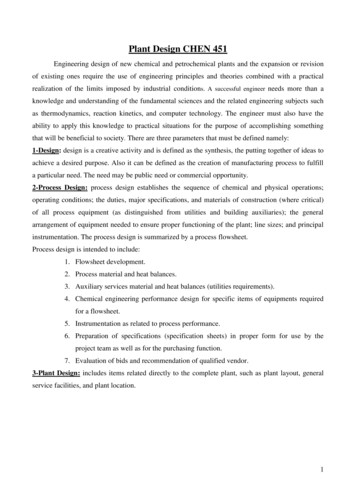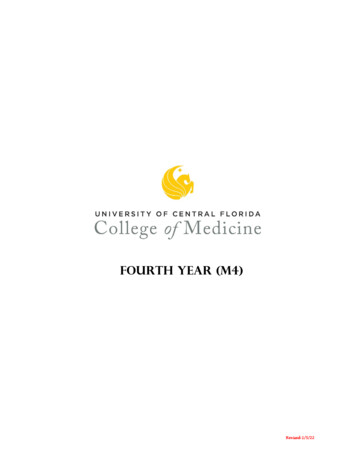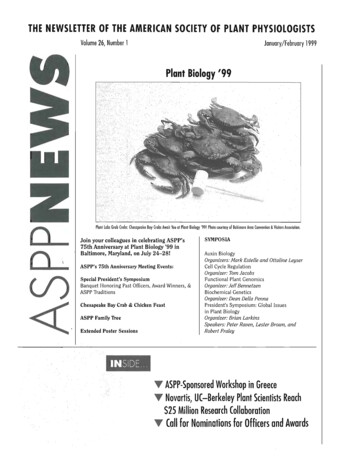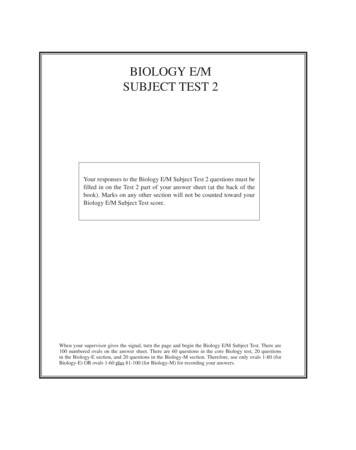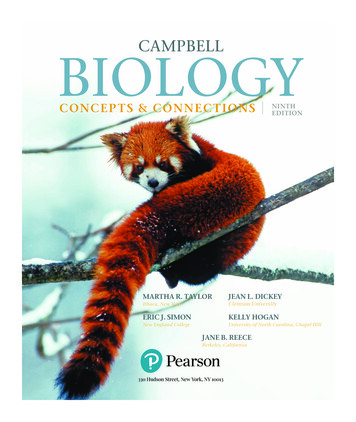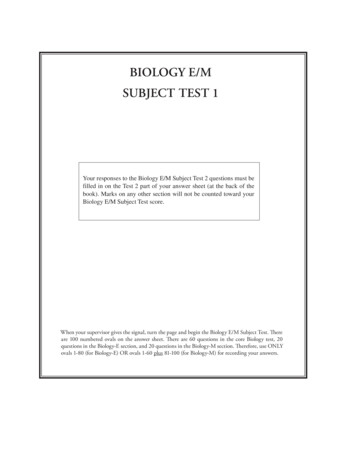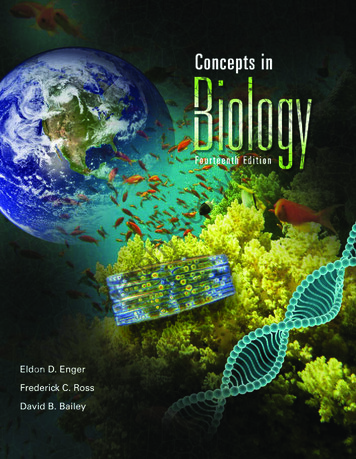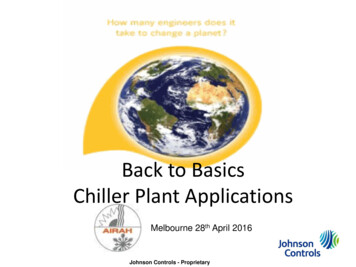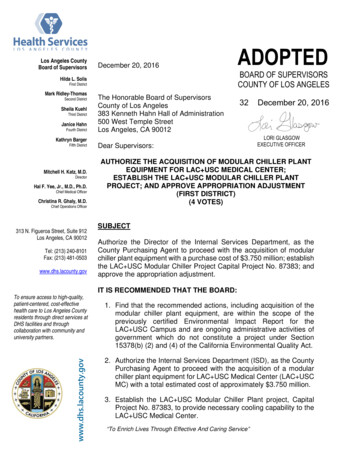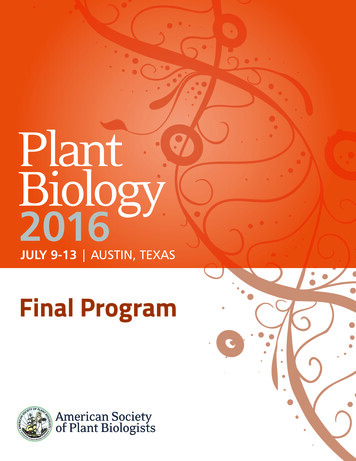
Transcription
Final Program
2 - Plant Biology 2016Download the Plant Biology 2016 App!Search Plant Biology 2016 in the App Store or Google Play Store.
Power Your Event withASPB Meeting & Event SolutionsASPB can help you with logistics management support for meetingslarge and small so you can focus on the activities that matter most to you:connecting, communicating and collaborating with other scientists.Download the Plant Biology 2016 App!Search Plant Biology 2016 in the App Store or Google Play Store.Plant Biology 2016 - 3
Plant Biology 2016 July 9-13, 2016Plant Biology 2016 SponsorsThank you to our Generous Sponsors of the Plant Biology 2016 Meeting! Withouttheir support, the meeting would not be possible.PlatinumGoldSilverBronze4 - Plant Biology 2016Download the Plant Biology 2016 App!Search Plant Biology 2016 in the App Store or Google Play Store.
Plant Biology 2016 July 9-13, 2016ContentsSectionPageComplete Daily Schedule8-26Friday, July 88Saturday, July 98Sunday, July 109-15Monday, July 1216-20Tuesday, July 1321-24Wednesday, July 1425Thursday, July 1526Friday, July 1626Committee Meetings27Step-by-Step App Guide28-29General Information34-35Exhibit Hall Schedule36Convention Center Floorplan38-39CORNELL UNIVERSITY PRESSComstock Publishing AssociatesTREESA Complete Guide to Their Biology andStructureROLAND ENNOS 19.95 paper“An accessible introduction to one of thewonders of the natural world—an intelligent,inspiring read for all nature enthusiasts.”—New Scientist[Forthcoming Fall 2016]TROPICAL FRUITS AND OTHEREDIBLE PLANTS OF THE WORLDMOSSES, LIVERWORTS, ANDHORNWORTSAn Illustrated GuideROLF BLANCKEZona Tropical PublicationsA Field Guide to Common Bryophytesof the NortheastRALPH POPEIllustrated with high-quality photographstaken on location, this field guide describesmore than three hundred species of tropicaland subtropical fruits, tubers, and spices.“The species descriptions are accurate, vivid,and draw upon the experience of the author.”—Robin W. Kimmerer, author ofGathering Moss and Braiding Sweetgrass 45.00 cloth 24.95 paper[Forthcoming Fall 2016]www.cornellpress.cornell.eduDownload the Plant Biology 2016 App!Search Plant Biology 2016 in the App Store or Google Play Store.Plant Biology 2016 - 5
Plant Biology 2016 July 9-13, 2016Call for PapersDfor SueadlinebExtenmissionded!2017 Focus Issue onFlowering and ReproductionEdited by Alice Cheung, Richard Amasino, Cris Kuhlemeier,and Thomas DresselhausDeadline for Submission Extended to August 12, 2016For more information, go to http://bit.ly/1TnDPivTo submit an article, go to http://pphys.msubmit.netCall for Papers2017 Focus Issueon StomataEdited by Keiko Torii, Timothy J. Brodribb,and Mike BlattDeadline for Submission: December 5, 2016For more information, go to http://bit.ly/1TnDPivTo submit an article, go to http://pphys.msubmit.netImage by: Haruko Hirukawa6 - Plant Biology 2016Download the Plant Biology 2016 App!Search Plant Biology 2016 in the App Store or Google Play Store.
Plant Biology 2016 July 9-13, 2016CALL FOR PAPERSFrom Benchto BiosphereCovers all aspects of plantscience including genetics,cell and molecular biology,ecology, evolution, agriculture,biotechnology and economics.Submit your research todaywww.nature.com/natureplantsDownload the Plant Biology 2016 App!Search Plant Biology 2016 in the App Store or Google Play Store.Plant Biology 2016 - 7
Plant Biology 2016 July 9-13, 2016Daily ScheduleStart TimeEnd Time2:00 PM6:00 PMFriday, July 8RoomRegistration OpenExhibit Hall FoyerSaturday, July 9Start TimeEnd TimeRoom8:00 AM6:30 PMRegistration Open9:00 AM10:00 AMUndergraduate Poster SessionExhibit Hall Foyer18Visit the future of plant biology as undergraduates display their posters during this special session. Undergraduates may move their posters to theexhibit/poster hall after this event if an abstract was submitted for the regular poster sessions.9:00 AM5:00 PMPoster Setup10:00 AM12:00 PMRe-imagining Postgraduate Training for the Plant Sciences14With as few as 10% of biological sciences Ph.D.s ultimately becoming faculty members in the U.S. – but an equally low number exiting the workforce– it is time to rethink training for plant scientists. How can doctoral students and postdocs best be prepared for the wide variety of careers available,even as they pursue their passion of experimental science? The workshop will bring together a diverse group of students and professionals to envisionideas for the future. Organized by the Plant Science Research Network (PSRN), a Research Coordination Network supported by the National ScienceFoundation. The PSRN is composed of eight scientific societies and councils from all disciplines of research in the plant sciences.Workshop AudienceThis workshop is intended for undergraduate and graduate students, postdocs, and professionalsPlease note that this workshop is free, though registration is required.1:00 PM3:30 PMOpening Address & Awards Presentation1:40 PM - 2016 Leadership in Science Public Service Award: HowardG. Buffett, CEO - The Howard G. Buffett Foundation - Decatur, Illinois2:10 PM - Cyril Zipfel, The Sainsbury Laboratory, “Plant ReceptorKinase-mediated Immunity: From the Plasma Membrane to the Field”Ballroom D2:50 PM - Bob Goldberg, University of California, Los Angeles, “Seedsof Hope - Back to the Future”3:30 PM4:00 PMCoffee Break4:00 PM6:30 PMMajor Symposium I: Small RNA Regulation of Genes andDevelopmentBallroom D FoyerBallroom DThe discovery of small regulatory RNAs, including microRNAs (miRNAs) and short interfering RNAs (siRNAs), has had a profound impact on ourunderstanding of how genes and transposons are regulated during development. The Gibbs Medal Symposium will feature talks by several leaders inthe field, whose laboratories are investigating the biogenesis, turnover and varied functions of miRNAs and siRNAs in plants.4:00 PM – Overview of Area by Organizer: Craig Pikaard, IndianaUniversity (Gibbs Medal Award Symposium)4:05 PM – The RNAs and Enzymes of RNA-directed DNA MethylationCraig Pikaard, Indiana University (Gibbs Medal Award Symposium)4:30 PM – Germline Reprogramming and Epigenetic Inheritance: How toAvoid Bad KarmaRob Martienssen, Cold Spring Harbor Laboratory5:00 PM – Coffee Break5:30 PM – The Parasitic Plant Cuscuta pentagona (dodder) ProducesLarge Numbers of 22 nt microRNAs that Regulate Host mRNAs DuringParasitismMichael Axtell, Penn State University6:00 PM - MicroRNA, Argonaute, and the Endoplasmic ReticulumXuemei Chen, University of California, Riverside6:30 PM7:45 PMOpening Welcome Reception8:00 PM9:00 PMHHMI BioInteractive Night at the Movies - Popped Secret: TheMysterious Origin of CornExhibit Hall 4Ballroom DHHMI BioInteractive and ASPB are pleased to announce HHMI Night at the Movies on July 9th at 8:00 pm in the Grand Ballroom D. This free event willinclude a screening of Popped Secret: The Mysterious Origin of Corn and a short Q&A afterwards. Please check your conference bag for a movie ticketor stop by the ASPB Education Booth #319 to pick one up. Event goers will get popcorn and a bar drink. Don’t forget to complete the online surveyafter the film for a chance to win a future ASPB Conference registration.8 - Complete Daily ScheduleDownload the Plant Biology 2016 App!Search Plant Biology 2016 in the App Store or Google Play Store.
Plant Biology 2016 July 9-13, 2016Daily ScheduleStart TimeEnd Time7:30 AM8:30 AMSunday, July 10RoomHow to Plan an Effective Workshop or Conference14So - you’ve been appointed to an organizing committee for a conference OR you have a fantastic idea and a burning desire to bring together someof the most inspirational scientists in your field to merge minds. But—where do you start? In this interactive workshop we will bring togetherrepresentatives from funding agencies, professional society meeting organizers and scientists to share their experiences planning a workshop orconference from beginning to the end. You’ll even be able to participate in a “plan-a-thon” where you’ll have the chance to collaborate on the detailsof planning a scientific meeting with advice from planning mentors. There will even be a handout with key takeaways from the session you canreference later.Siobhan Brady, University of California, DavisPre-registration required for this workshop. No fee. Breakfast will be provided.8:00 AM8:30 AMMorning Coffee Service8:00 AM5:30 PMRegistration Open8:00 AM9:00 PMPosters Open8:30 AM11:00 AMMajor Symposium II: Developing Healthier Foods: Quality,Nutrition, and Molecular GastronomyExhibit Hall 4Exhibit Hall FoyerExhibit Hall 4Ballroom DThis symposium focuses on foods, emphasizing flavor and nutrition. Engaging the public using foods, flavor and nutrition to illustrate modernscientific methodologies. How large, inter-disciplinary approaches including genetics, biochemistry, sensory science and medicine can tackle highlycomplex challenges and facilitate real world solutions. What do we want in our foods? How do we produce the foods that people want in order to eatbetter and healthier?8:30 AM – Overview of Area by Organizer: Harry Klee, University ofFlorida8:35 AM – The Benefits of a Colourful Diet; Some of the Science Behind5-A-DayCathie Martin, John Innes Centre9:00 AM – Exploring all the Options Towards Engineering an EvenHealthier AppleAndrew Allan, Plant and Food in New Zealand9:30 AM – Coffee Break10:00 AM – An Interdisciplinary Approach to Understanding andImproving Tomato FlavorHarry Klee, University of Florida10:30 AM - Do You Taste What I Taste and Do You Like It?Linda Bartoshuk, University of Florida9:30 AM10:00 AMCoffee Break11:00 AM12:00 PMPoster SessionExhibit Hall 411:00 AM7:00 PMExhibit Hall OpenExhibit Hall 411:30 AM1:00 PMBioinformatics Resources for Plant Biology ResearchBallroom D Foyer18ABThe community of plant bioinformatics databases would like to continue the practice that has evolved of the past two years of exposing the contentand usefulness of its sites to the plant biology research community. Each group will take 20-30 min (according to time available) to walk users throughthe site explaining the nature of the data content and the tools available. Due to time limitations, these will not be hands-on workshops. Contributorsto the workshops in 2015 were Araport, BioAnalytic Resource, KBase, Legume Federation, MaizeGDB, Planteome and TAIR. Some groups that haveparticipated previously did not attend in 2015 due to funding or other issues but may return in future years. These include PlantCyc and the SolGenomics Network.Justin Preece, Oregon State UniversityLunch is available for sale in the exhibit area.No pre-registration is required for this workshop. Seating is first-come, first-served.Download the Plant Biology 2016 App!Search Plant Biology 2016 in the App Store or Google Play Store.Complete Daily Schedule - 9
Plant Biology 2016 July 9-13, 2016Daily ScheduleStart TimeEnd Time11:30 AM1:00 PMSunday, July 10RoomThe Education Committee Workshop – Writing Science: InspireCareful Thinking and Useful DiscourseBallroom FWriting for or about science is a critical skill used across a wide variety of science-based careers as well as for science literacy. This workshop addressesoverarching concepts and examples for using writing (communicating) about plant science in the classroom and sharing plant-based materials withothers. Participants will explore writing options useful for teaching in undergraduate settings (small and large enrollment). Key themes will include: Critical evaluation and revision of science articles in the public domain to improve not only accuracy and scope of plant science materials beingdisseminated, but also to enhance critical thinking in our students; as writing quality improves, so, too does the author’s ability to think. Incorporating technical writing for plant science education to broaden outreach and impact of plant science education. Science writing for non-specialist audiences should tell the story behind the science and illuminate (sans jargon) how the data link to big ideas andimportant issues.Sponsor: Education CommitteeOrganizer: Sarah Wyatt, Education Committee ChairLunch is available for sale in the exhibit area.10 - Complete Daily ScheduleDownload the Plant Biology 2016 App!Search Plant Biology 2016 in the App Store or Google Play Store.
Plant Biology 2016 July 9-13, 2016Daily ScheduleStart TimeEnd Time11:30 AM1:30 PMSunday, July 10RoomHow to Present Yourself and Make your Elevator Pitch(Bring your Lunch)14In this comprehensive, hands-on workshop, presented by the American Society for Biochemistry and Molecular Biology, participants will learn howto construct an elevator pitch, a brief, engaging research description that can be used to do exactly that.During the workshop, participants will learn the importance of having strong communication skills. We will go through examples of successful (andunsuccessful) communication approaches, and will walk through the necessary steps for constructing a successful elevator pitch. Participants willthen break out into groups in order to work directly with one of our expert mentors to develop their own pitch. To put practice into play, the ASPB hasarranged to have a videographer present at the meeting so that participants can be recorded trying out their elevator pitches.Lunch may be purchased in the exhibit hall or concession stands in the lobby.Organizers: Geoff Hunt & Teresa Evans11:30 AM1:00 PMPublishing in and Reviewing for the Plant Cell16ABWhat do Plant Cell editors look for in a submission? Why is the cover letter so important? How does one respond to a negative review? Editor-in-Chiefof The Plant Cell Sabeeha Merchant and Senior Features Editor Nan Eckardt will provide an overview of the editorial decision process and describewhat happens after your paper is submitted. Guidelines for how to respond to peer review as well as how to be an effective peer reviewer will alsobe discussed.Lunch may be purchased in the exhibit hall or concession stands in the lobby.Sabeeha Merchant, University of California, Los Angeles & Nan Eckardt, ASPB11:30 AM1:00 PMUSDA, DOE and NSF GRANTSMANSHIP Workshop17ABThe workshop will feature talks on Plant related funding opportunities from each agency by Program staff and a panel discussion with Program staffat the end of all the talks. In addition to the workshop, there will be ample time to meet the Program staff at the Joint USDA, DOE and NSF Booth todiscuss the funding opportunities offered by the respective agencies.Lunch may be purchased in the exhibit hall or concession stand in lobby.No pre-registration is required for this workshop. Seating is first-come, first-served.1:30 PM3:17 PMConcurrent Symposium 1: Salt & Minerals Track: Abiotic, Biotic1:30 PM: Overview of Area by Chair, Jiping Liu, Robert W. HolleyCenter for Agriculture and Health, USDA-ARS1:35 PM: Identification of Plant Vacuolar Transporters MediatingPhosphate StorageTeng-Kuei Huang, Agricultural Biotechnology Research Center,Academia Sinica1:55 PM: Characterization of the Role of an Iron-binding Protein in SeedDevelopmentRozalynne Samira, North Carolina State University2:15 PM: Computational Prediction of Regulatory Relationships: NewPlayers in the Arabidopsis thaliana Iron Deficiency ResponseAnna Matthiadis, North Carolina State University1:30 PM3:17 PM2:35 PM: Metal Hyperaccumulation and Hypertolerance in ArabidopsishalleriUte Kraemer, Ruhr University Bochum2:55 PM: NIP1;2 Is a Plasma Membrane-localized Channel for AluminumUptake and Aluminum Tolerance in ArabidopsisJiping Liu, Robert W. Holley Center for Agriculture and Health, USDAARS3:15 PM: Genome Wide Association Analysis of Salinity Adaptation Traitsin Medicago truncatula HapMap PopulationsYun Kang, The Samuel Roberts Noble Foundation, Inc.Concurrent Symposium 2: Epigenetics Track: Genomics1:30 PM: Overview of Area by Chair, Chuanzhu Fan, Wayne StateUniversity1:35 PM: Modelling Transcript Abundance from ChromatinImmunoprecipitation Data in Plants: Lessons from Eucalyptus grandisSteven Hussey, University of Pretoria1:55 PM: Small RNAs from Natural Antisense Transcripts of GhMIXTAMYBLike3 A12 Play Roles in Cotton Seed Fiber DevelopmentXueying Guan, Nanjing Agricultural UniversityDownload the Plant Biology 2016 App!Search Plant Biology 2016 in the App Store or Google Play Store.17AB16AB2:15 PM: Elucidating the Molecular Mechanisms of Histone Lysine toMethionine Mutation in PlantsDean Sanders, University of Wisconsin-Madison2:35 PM: Generating a Novel Early Flowering Phenotype in Brassicanapus by Modifying Epigenetic InformationRaghavendra prasad Savada, Agriculture and Agri-Food Canada2:55 PM: Epigenetic Divergence and Evolution of Plant New GenesChuanzhu Fan, Wayne State UniversityComplete Daily Schedule - 11
Plant Biology 2016 July 9-13, 2016Daily ScheduleStart TimeEnd Time1:30 PM3:17 PMSunday, July 10RoomConcurrent Symposium 3: Seed Development Track:Development1:30 PM: Overview of Area by Chair, Donald McCarty, University ofFlorida1:35 PM: The Role of Plastid Signaling in Maize EmbryogenesisDonald McCarty, University of Florida1:55 PM: The Maize Dosage-effect Defective kernel1 (ded1) LocusEncodes a MYB Transcription Factor Controlling Endosperm Developmentand Grain-fillJanaki Mudunkothge, University of Florida1:30 PM3:17 PM1:35 PM: In Vitro Reconstruction and Analysis of Evolutionary Variation ofthe Tomato Acylsucrose Metabolic NetworkPengxiang Fan, Michigan State University1:55 PM: Role of Bifunctional Ammonia-Lyase in Grass Cell WallBiosynthesisJaime Barros-Rios, University of North Texas1:30 PM3:17 PM1:35 PM: Engineering Oilseed Crop to Produce DHA Using Algal PufaSynthases - A Novel ApproachBala Pudota, Dow AgroSciences1:55 PM: Root Traits Contributing to Drought Tolerance of Maize InbredLines in the Drought Tolerant Maize for Africa ProjectPatompong Saengwilai, Mahidol University3:45 PM2:35 PM: A Search for Novel GID1 Interacting ProteinsAmber Hauvermale, Washington State University2:55 PM: Maternal AFB1 Positively Regulates Seed Dormancy inArabidopsisMing Yang, Oklahoma State UniversityCoffee Break18AB2:15 PM: Relaxation of Tyrosine Pathway Regulation Facilitated theEvolution of Betalain Pigmentation in CaryophyllalesSamuel Lopez Nieves, University of Wisconsin - Madison2:35 PM: Insights into a Role of Arabidopsis Mediator in the CrosstalkBetween Glucosinolate Biosynthesis and Phenylpropanoid BiosynthesisJeong Im Kim, Purdue University2:55 PM: Sensor Kinases TOR and GCN2 Orchestrate Translation andAutophagy in Response to Carbon, Nitrogen and Sulfur Supply forCysteine Synthesis in Higher PlantsYihan Dong, University of HeidelbergConcurrent Symposium 5: Novel Breeding Resources Track:Various1:30 PM: Overview of Area by Chair, Steven Strauss, Oregon StateUniversity3:20 PM2:15 PM: Regulation of Calcium Accumulation in Finger Millet (EleusineCoracana) Grains by CBL-CIPK Interaction and Its Potential for CropBiofortificationAnil Kumar, G.B. Pant University of Agriculture & TechnologyConcurrent Symposium 4: Metabolic Diversity Track: Biochem1:30 PM: Overview of Area by Chair, Hiroshi Maeda, University ofWisconsin - Madison19AB18CD2:15 PM: Biofortification of Chickpea for Enhanced Iron Accumulationand BioavailabilityThi My Linh Hoang, Queensland University of Technology2:35 PM: Lysine-rich Transgenic Rice Enhanced the Growth, Strength andQuality of Muscles in Growing RatsPui Kit Suen, The Chinese University of Hong Kong2:55 PM: Wide Mutation Spectrum in Floral Genes from Single- andDouble-guide RNA CRISPR/Cas9 Transgenic PoplarsSteven Strauss, Oregon State UniversityExhibit Hall 4Notes12 - Complete Daily ScheduleDownload the Plant Biology 2016 App!Search Plant Biology 2016 in the App Store or Google Play Store.
Plant Biology 2016 July 9-13, 2016Daily ScheduleStart TimeEnd Time3:45 PM5:34 PMSunday, July 10RoomConcurrent Symposium 6: Plant-Insect Interactions Track:Abiotic, Biotic3:45 PM Overview of Area by Chair, Meredith Schuman, Max PlanckInstitute for Chemical Ecology3:50 PM: Oviposition by Pieris brassicae Induces a Systemic AcquiredResistance in Arabidopsis thalianaOlivier Hilfiker, University of Lausanne4:10 PM: Turnabout Is Fair Play: The Fall Armyworm Co-opts a PlantDefense Protein for Its Own BenefitSwayamjit Ray, The Pennsylvania State University4:30 PM: Understanding the Role of miRNAs in Auxin Signaling during Vatmediated Aphid ResistanceSampurna Sattar, Penn State University3:45 PM5:34 PM3:50 PM: High Fidelity Detection of QTL for Biomass Production fromRapid Imaging of a C4 Grass Crop in the FieldAndrew Leakey, University of Illinois at Urbana-Champaign4:10 PM: Revealing the Temporal Patterns of QTL Associated with StressResponsive Traits in CottonMichael Gore, Cornell University4:30 PM: Open-source Tools for High-throughput Plant PhenotypingNoah Fahlgren, Donald Danforth Plant Science Center3:45 PM5:35 PM4:50 PM: Genetic Mapping Shows Intraspecific Variation andTransgressive Segregation for Caterpillar-induced Aphid Resistance inMaizeVered Tzin, Boyce Thompson Institute for Plant Research5:10 PM: The Smell of Spacetime? Plant Volatiles in Four DimensionsMeredith Schuman, Max Planck Institute for Chemical Ecology5:30 PM: Pennycress Nectaries and Nectar: Molecular Dissection andEvaluation as a Nutritional Resource for PollinatorsClay Carter, University of Minnesota Twin CitiesConcurrent Symposium 7: Phenotyping for the Future Track:Genomics3:45 PM Overview of Area by Chair, Lisa Ainsworth, University ofIllinois3:50 PM: Temporal and Spatial Uncoupling of WUSCHEL Expression andCytokinin Signaling in the Shoot Apical MeristemPaul Tarr, California Institute of Technology4:10 PM: LEUNIG Interacts with ANGUSTIFOLIA3 and Functions asTranscriptional Co-activator During Leaf and Flower DevelopmentMillion Tadege, Oklahoma State University16AB4:50 PM: Probabalistic Network Modeling Predicts Gene RegulatingMetabolic Pathway Underlying Quantitative Trait Locus for Highthroughput Hyperspectral Imaging IndexRJ Cody Markelz, University of California, Davis5:10 PM: Live Cell Imaging of Phosphate Distribution Profiles inArabidopsisWayne Versaw, Texas A&M University5:30 PM: A Genome-wide Indexed Mutant Library of Chlamydomonasreinhardtii Provides a Platform for High-throughput Genetics Research inPlantsXiaobo Li, Carnegie Institution for ScienceConcurrent Symposium 8: Networks in Development Track:Development3:45 PM: Overview of Area by Chair, Daniel Runcie, University ofCalifornia, Davis17AB19AB4:30 PM: Spatial Encoding of Temporal Memory Through theVernalization Pathway of Arabidopsis thalianaDaniel Runcie, University of California, Davis4:50 PM: The CDK8 Module of Mediator Controls Vegetative PhaseChange in Arabidopsis thalianaManuel Buendia-Monreal, Cinvestav Irapuato/Langebio5:10 PM: A Network Approach to Study Brassinosteroid-Regulated PlantGrowth and Stress Responses in ArabidopsisTrevor Nolan, Iowa State UniversityNotesDownload the Plant Biology 2016 App!Search Plant Biology 2016 in the App Store or Google Play Store.Complete Daily Schedule - 13
Plant Biology 2016 July 9-13, 2016Daily ScheduleStart TimeEnd Time3:45 PM5:35 PMSunday, July 10RoomConcurrent Symposium 9: Signaling Track: Signaling3:45 PM: Overview of Area by Chair, Amy Marshall-Colon, Universityof Illinois at Urbana-Champaign3:50 PM: Crossed Signals: Using Systems Biology to Uncover aTranscriptional Crosstalk NetworkAmy Marshall-Colon, University of Illinois at Urbana-Champaign4:10 PM: IBR5 Is a Central Regulator of Plant Hormonal ResponsesNihal Dharmasiri, Texas State University3:45 PM5:35 PM4:30 PM: Unraveling an Elegant Net of Sensation and Reaction: ModelingResponses to Multiple Stressors in TomatoClaire Hann, University of South Carolina4:50 PM: Cell Wall Regulation at the Trans-Golgi NetworkHeather McFarlane, University of Melbourne5:10 PM: RGS Proteins Are Prevalent in Monocots and Maintain FunctionalCompatibility with Gα Across KingdomsSona Pandey, Donald Danforth Plant Science CenterConcurrent Symposium 10: Plastids & Organelles Track: CellBiology3:45 PM Overview of Area by Chair, Liwen Jiang, The ChineseUniversity of Hong Kong3:50 PM: Biogenesis and Function of Plant Multivesicular PrevacuolarCompartmentLiwen Jiang, The Chinese University of Hong Kong4:10 PM: Improving Plant Stress Responses to Stress-induced Senescenceby Silencing Thylakoid Turnover in Crop PlantsEduardo Blumwald, University of California, Davis4:30 PM: Cytoplasmic Control of Plastid Retrograde Signaling by SCF(DIF)Mediated Degradation of DIFFERENTIATION and GREENING-LIKEZhihua Hua, Ohio University18AB18CD4:50 PM: Chloroplast Protein Homeostasis; Protein Maturation andDegradationKlaas van Wijk, Cornell University5:10 PM: Molecular Function of a Plastid-targeted RNA-binding Protein inRNA Editing and PhotosynthesisYan Lu, Western Michigan University5:30 PM: The Role of Arabidopsis SIG2 in Phytochrome-DependentAnterograde Signaling and Coordinated Control of Nucleus andChloroplast Gene Expression During PhotomorphogenesisSookyung Oh, Michigan State University5:32 PM: Guard Cell Photosynthesis Is Critical for Stomatal TurgorProduction, yet Does Not Directly Mediate CO2- and ABA-induced StomatalClosingTamar Azoulay-Shemer, University of California, San Diego5:35 PM6:00 PMExclusive Poster Session Reception RoomExhibit Hall 45:45 PM6:30 PMExclusive Poster Session “Y” PresentationsExhibit Hall 46:30 PM7:00 PMExclusive Poster Session “Z” PresentationsExhibit Hall 47:00 PM9:00 PMPosters OpenExhibit Hall 47:00 PM9:00 PMMinority Affairs Committee DinnerBallroom FThe Minority Affairs Committee Dinner Theme is “Effective Mentoring – Evidence-based Tools and Strategies”. SPEAKER: Dr. Amber Smith, Directorof Mentor and Mentee Training Wisconsin Institute for Science Education and Community Engagement University of Wisconsin-Madison and MasterFacilitator for the National Research Mentoring Network.Real time training can m ake the difference between a mutually beneficial and productive mentoring relationship and one that’s draining for thementor and discouraging for the mentee. Dr. Smith will present data on the positive impact of research mentor training and provide an overview ofresources for implementing research mentor training at your campus. Opportunites for mentors and mentees through NRMN will also be shared.The session will conclude with a panel discussion of indviduals who have used some of the resources available through NRMN in their professionalpractice to promote inclusion and the sucess of diverse trainees.Amber Smith, University of Wisconsin-MadisonPlease note, pre-registration is required for this workshop.Cost: 35.00 regular, 25.00 for students14 - Complete Daily ScheduleDownload the Plant Biology 2016 App!Search Plant Biology 2016 in the App Store or Google Play Store.
Plant Biology 2016 July 9-13, 2016Daily ScheduleStart TimeEnd Time7:00 PM9:00 PMSunday, July 10RoomPUI Networking Workshop: Funding Research at PUIsBallroom EThis workshop is for faculty currently working at primarily undergraduate institutions (PUIs) or younger scientists who would like to get a job at aPUI. PUIs are defined as institutions that offer few PhDs in the sciences. While teaching is a large part of being a PUI faculty member, maintaining asuccessful research program is also critical for career advancement and for providing undergraduates with high-caliber research experiences. Thisworkshop will include presentations and small group discussions of the best practices in research at a PUI. The focus of the workshop for 2016 willbe on obtaining funding from NSF and USDA. PUI faculty members who have been successful in obtaining funding will share their experience andprogram officers will address the concerns of preliminary data and previous publications.Please note that pre-registration is required for this workshop.Cost: 25.007:00 PM9:00 PMRelationship Building in Science Communication14This workshop provides guidance on building relationships with journalists and policymakers as well as the ethical issues surrounding publicengagement. Forming relationships with journalists and encouraging them to speak with experts is key for disseminating science-based informationto the public. Further, relationships between scientists and policymakers can help policymakers serve the public interest with science-basedregulation and laws. Participants in this workshop will learn good practices for interacting with journalists and policymakers. Building effectiverelationships requires trust, so this session will also include guidance on how to handle conflicts of interest and other ethical issues in sciencecommunication. Ample time will be provided for discussion and materials and recordings from this session will be published on Plantae.org.Please note that pre-registration is required for this workshop.Cost: 25.00Partner with us for your protein interaction project!Discover novel protein interactions with ULTImate Y2H- Benefit from the most exhaustive Yeast Two-Hybrid screening withour patended cell to cell mating process- Choose among 90 cDNA libraries in more than 25 species15 years of experienceover 300 publications1800 customers worldwideJoin us on Twitter & LinkedIn- Save time with detailed data analysis & the best scientific supportWe like to interact!Contact usFR: 33 (0)1 58 10 38 29US: (616) 959 7100services@hybrigenics.comVisit our websitehybrigenics-services.comPhoto Credit: The National Academic Bolshoi Opera and Ballet Theater of the Republic of Belarus, AFP, Viktor DrachevPROTEIN INTERACTION IS AN ARTLET THE EXPERTGUIDE YOUThe protein interactions expertDownload the Plant Biology 2016 App!Search Plant Biology 2016 in the App Store or Google Play Store.Complete Daily Schedule - 15
Plant Biology 2016 July 9-13, 2016Daily ScheduleMonday, July 11Start TimeEnd TimeRoom8:00 AM8:30 AMMorning Coffee Service8:00 AM5:30 PMRegistration Open8:00 AM9:00 PMPosters Open8:30 AM11:00 AMMa
Gathering Moss and Braiding Sweetgrass [Forthcoming Fall 2016] TROPICAL FRUITS AND OTHER EDIBLE PLANTS OF THE WORLD An Illustrated Guide ROLF BLANCKE Zona Tropical Publications 45.00 cloth Illustrated with high-quality photographs taken on location, this fi eld guide describes more than three hundred species of tropical
